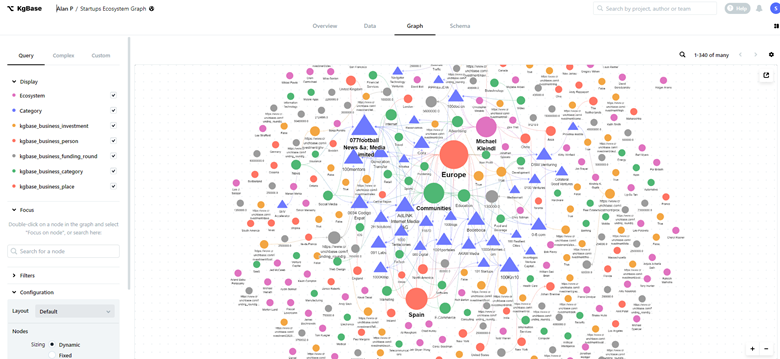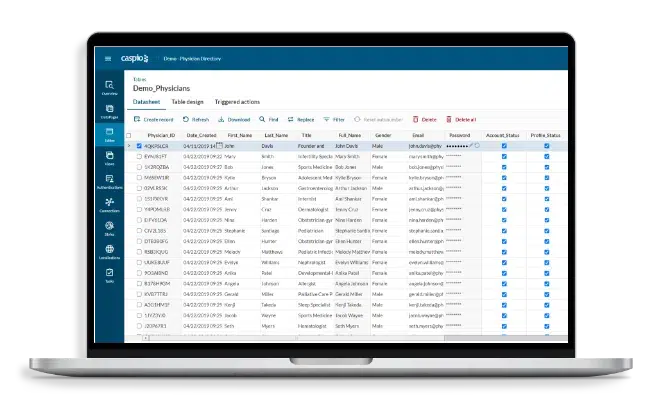Develop Open System Databases Quickly with the very best No-Code Tools Available
Develop Open System Databases Quickly with the very best No-Code Tools Available
Blog Article
Checking Out the Advantages of Scalable Databases That Require No Coding Skills for Effective Data Management Solutions
The appearance of scalable databases that remove the requirement for coding abilities presents a transformative chance for organizations looking for efficient information administration remedies. As we think about the effects of such improvements, it comes to be vital to examine exactly how they can improve the landscape of data administration and drive lasting development in a competitive atmosphere.
Improved Ease Of Access for Customers
Enhanced ease of access for individuals is a critical element of scalable databases, making certain that data management systems are easy to use and intuitive. In an age where data-driven choices are paramount, ease of access enables a bigger variety of users, including those without substantial technical expertise, to engage with database systems efficiently. This democratization of information gain access to assists in boosted cooperation across departments, equipping workers to remove insights and make notified decisions.
Easy to use user interfaces, such as aesthetic data and drag-and-drop attributes depiction, streamline intricate data communications. These improvements reduce the discovering contour connected with conventional database management, making it possible for customers to concentrate on leveraging data instead than grappling with technological complexities. Moreover, scalable data sources typically incorporate adjustable dashboards and real-time analytics, supplying users with instant understandings tailored to their details requirements.

Cost-Effectiveness and Source Cost Savings
Effective information monitoring not just depends upon accessibility yet additionally on cost-effectiveness and source cost savings. Scalable databases made for customers without any coding skills significantly lower monetary concerns generally associated with traditional data source administration systems. By getting rid of the need for specialized programming knowledge, organizations can allocate their sources extra efficiently, focusing funds on core organization activities instead of extensive training or employing experienced employees.
Moreover, these data sources often use cloud-based remedies, which further minimize prices connected to equipment and upkeep. Organizations can scale their data source services according to their needs, staying clear of the expenses incurred from over-provisioning resources. This flexibility implies organizations can adjust to changing demands without sustaining unneeded prices, leading to substantial long-lasting financial savings.
Additionally, user-friendly interfaces enhance information access and monitoring procedures, reducing the time spent on administrative jobs. This performance converts right into labor cost financial savings, permitting teams to focus on critical campaigns as opposed to routine upkeep. On the whole, taking on scalable data sources that need no coding skills cultivates a much more affordable approach to data management, making it possible for companies to maximize their sources while keeping high degrees of functional performance.
Improved Partnership Across Teams

Furthermore, scalable data sources promote seamless communication amongst group participants. With user-friendly user interfaces that require no coding skills, workers can quickly develop, modify, and share reports or dashboards tailored to their details needs. This democratization of data empowers non-technical individuals to add insights, improving the collective atmosphere.
In addition, these data sources sustain concurrent gain access to, enabling several customers to work with the same dataset at the same time. This feature boosts performance, as groups can involve in joint information evaluation without the threat of variation control concerns. The capacity to leave notes or remarks straight within the data source further promotes discussion and makes clear information analyses.
Streamlined Information Administration Processes
In today's data-driven atmosphere, organizations recognize the necessity of structured data monitoring refines to optimize performance and precision. By leveraging scalable databases that require no coding skills, businesses can streamline their information handling and decrease the complexities typically associated with typical data source systems. This ease of access equips non-technical individuals to engage straight with data, helping with quicker decision-making and reducing dependence on specialized IT workers.
Streamlined information administration processes boost process by automating routine tasks such as information entry, recognition, and reporting. Automated data assimilation makes sure that information from numerous sources is accumulated perfectly, eliminating silos and cultivating a merged view of essential company metrics (no-code). Furthermore, straightforward user interfaces allow employees to manipulate information easily, allowing them to generate understandings that drive tactical campaigns without the requirement for extensive training.
This effectiveness not only accelerates functional procedures but also reduces the possibility for human error, guaranteeing that information remains reputable and exact. Ultimately, streamlined data monitoring procedures through scalable databases cause improved performance, allowing organizations to focus on core tasks while making certain that their information management practices you could try these out are effective and reliable.
Scalability for Growing Services

For expanding enterprises, the capacity to scale up or down is critical. A scalable data source can manage an influx of data generated from brand-new clients, products, or services, making certain that service procedures remain continuous. These databases provide the ability to handle peak loads successfully, which is vital during durations of rapid development or seasonal spikes.
Furthermore, many scalable data source services are made with straightforward interfaces that call for no coding skills, empowering non-technical personnel to manage information efficiently (no-code). This democratization of information administration permits organizations to allot resources purposefully and decrease dependence on specialized IT workers
Inevitably, embracing a scalable data source not only boosts functional efficiency however additionally promotes a setting where companies can progress and introduce without the restrictions of typical database systems. This versatility placements organizations for long-lasting success in today's affordable landscape.
Conclusion
To conclude, scalable data sources that require no coding skills give significant advantages for effective information management. These systems enhance access for non-technical users, decrease functional prices, and advertise partnership throughout groups. By streamlining data administration procedures and supplying scalability for expanding businesses, such services make it possible for companies to adapt to altering demands successfully. Inevitably, the fostering of these straightforward data sources cultivates technology and placements businesses for long-term success in a dynamic environment.
Enhanced accessibility for customers her explanation is a crucial aspect of scalable data sources, making sure that information administration systems are intuitive and user-friendly.Easy to use interfaces, such as visual data and drag-and-drop features depiction, streamline complicated data communications. Overall, taking on scalable data sources that need no coding skills cultivates a much more affordable approach to information administration, enabling companies to optimize their resources while maintaining high degrees of functional effectiveness.
By leveraging scalable databases that need no coding skills, businesses can streamline their data handling and minimize the complexities commonly connected with visit this site right here traditional data source systems - no-code.Streamlined information management procedures enhance operations by automating routine jobs such as data entry, recognition, and reporting
Report this page